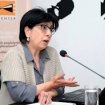Possibilities and Understanding of the Karabakh Conflict Resolution 25 Years after the Ceasefire : Page 4 of 10
democracies, can lead to the deterioration, and not to the improvementof settlement prospects. Preciselybecauseleadersneedlegitimacy...
Arif Yunusov - Much has to do with Pashinyan’s figure and with the inflated expectations from him. The issue is not about legitimacy or the lack of it: this factor does not play a role in conflict resolution, it is from the domain of political games, rather than that of settlements. The question is that Pashinyan initially became the symbol of a new and, most importantly, democratic Armenia. And he managed to win not only great support in the Armenian society and abroad, but most interestingly and importantly, also among a certain part of the Azerbaijani society, which is long tired of Aliyev’s rule and has been putting forward demands on the changes necessary in the country. As a result, there was even a new factor, emergingwithin the Karabakh settlement context under the name of "democrat-dictator". It may sound paradoxical, but Aliyev could make concessions to S. Sargsyan (Editor– the former President of the Republic of Armenia), but he will not make concessions to Pashinyan, who has come to power on the wave of the revolution and has the image of a democrat. Manydonottakethismomentintoaccount.
On the Response to the Question on NKR’s Inclusion in the Negotiation Process
Sergey Markedonov – In the earlier stages too, the Armenian leadership used to say that any solution to the conflict should definitely take into account the opinion of the Karabakh people. But it is one thing to appeal to their opinion, and quite another thing to demand the presence of the NKR delegation at the negotiations.Certainly, such a formulation is not acceptable for Azerbaijan. Armenian experts, politicians and diplomats refer to both the Bishkek Protocol and the Agreement of May 12, 1994, referring to the involvement of the NKR as precedent. Well, that is right, but in politics it is important to use the right moment. As the classic figure taught us, "Today is early, tomorrow is too late." No one will return the missed opportunity of involving NKR in the negotiations in advance as of today... Certainly, the presence of a separate NagornoKarabakhdelegation will not automatically make Baku more compliant. And it shall not necessarily make the negotiations much easier. Moreover, at the very beginning, theKarabakh people may bring in additional emotions, which are not always constructive to the same. There will be new political declarations, slogans, and accusations. But does this mean that real problems will not be discussed? Is NK’s status a virtual problem? How about the status of the territories around the former NKAO? Especially since out of these seven territories the situation of Lachin and Kelbajar differs from that of Fizuli or Zangelan. The first two have actually become anintegral system with the unrecognized NKR. I am not sayingthis is good or bad, this is just a statement of the fact. Hence, real problems will be discussed, because we cannot get away without them. But a new topic will arise. At first glance, if the NKR is allowed to the table of negotiations, Armenia will score







 +37410 563363
+37410 563363
 1/3 Buzand Str, 8 Floor, Yerevan, Armenia
1/3 Buzand Str, 8 Floor, Yerevan, Armenia